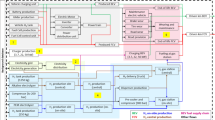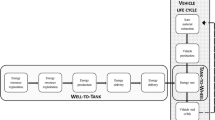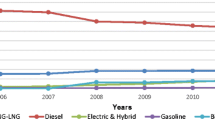Abstract
Purpose
Environmental impacts of battery electric vehicles (BEVs) and internal combustion engine vehicles have been broadly studied and compared. However, there is scarce evidence of studies analyzing the potential effect of evolution key factors. The purpose of this study was to evaluate what would be the environmental impact of manufacturing BEVs and battery electric buses (BEBs) in Brazilian southeast, whereas vehicle mass reduction, material switching, energy consumption, battery improving, geographic adaptation of life cycle inventories, and electricity mix evolution effects are considered.
Methods
The methodology was based on adapting a representative number of global Ecoinvent V.3.2 datasets to better represent local conditions and subsequently to include evolution parameters for a 2030 scenario. Thus, we were able to establish a comparison for BEVs and BEBs in 2015 and 2030 for Brazilian and global conditions. This study compared BEV and BEB production (one vehicle as comparison unit) and also well-to-wheel (WTW) stage (1 km as functional unit). The research envisioned mass reduction configurations for cars and buses in 2030. BEV analysis in 2030 includes two material switching scenarios: plastic and aluminum prototypes.
Results and discussion
For one BEV as comparison unit, ozone depletion, human toxicity, metal depletion, and ecotoxicities displayed larger impacts for Brazilian cars, mostly due to material switching in the new prototypes, in spite of total mass reduction. In fact, neither the BEBs nor BEVs made in Brazil displayed a consistent environmental advantage over the global reference; and in fact, low production plants might cause larger impacts.
Conclusions
Life expectancy increase is suggested to be more effective in reducing impacts than mass or energy consumption reduction. For the 2030 BEV, an unexpected burden shifting result appears. Ozone depletion increases for the Brazilian aluminum prototype since emissions arising from scrap treatment do have a significant impact, even though mass reduction was considered. Bus results portrayed a tendency for Brazilian bus to perform better than its global counterpart except for metal depletion, ecotoxicities, and ozone depletion. A large environmental contribution from treatment of mining residues is common for human toxicity and freshwater eutrophication, the most concerning categories. Large contributions from mining residues led us to conclude that in order to manufacture environmentally competitive BEBs and BEVs, either reduction of impacts on metal extraction, e.g., copper, magnesium, etc., or metal use decrease must be prioritized. Negative consequences of vehicle evolution are especially concerning for human health and bodies of water, and impact decrease will be unlikely, at least until 2030.










Similar content being viewed by others
Notes
In order to facilitate the exhibition of results, terrestrial ecotoxicity, freshwater ecotoxicity and marine ecotoxicity impact categories were added into a single category defined as ecotoxicities (kg 1.4-dB eq.).
References
ABAL (2015) Reciclagem no Brasil. In: Assoc. Bras. do Alumínio. http://abal.org.br/sustentabilidade/reciclagem/reciclagem-no-brasil/. Accessed 23 Aug 2017
AES Brasil (2017) BYD wants to tear down the barriers for electrics in Brazil. In: Innovation. http://www.inovacaoaes.com.br/en/blog/2017/03/10/byd-wants-to-tear-down-the-barriers-for-electrics-in-brazil/. Accessed 28 Nov 2017
Agência Nacional de Energia Elétrica (2018) Minuta de edital : “Desenvolvimento de soluções em mobilidade elétrica eficiente.” 1
Alessandrini A, Cignini F, Ortenzi F et al (2017) Advantages of retrofitting old electric buses and minibuses. In: Energy Procedia. Elsevier, Lecce, pp 995–1002
Althaus H-J, Gauch M (2010) Vergleichende Ökobilanz individueller Mobilität : Elektromobilität versus konventionelle mobilität mit Bio- und fossilen Treibstoffen. EMPA-Swiss Federal Laboratories for Materials Science and Technology. Technologie und Gesellschaft
Andrade M d F, Kumar P, de Freitas ED et al (2017) Air quality in the megacity of São Paulo: evolution over the last 30 years and future perspectives. Atmos Environ 159:66–82
Argonne National Laboratory (2016) GREET life-cycle model. https://greet.es.anl.gov/greet/documentation.html
Avid Technology Group Ltd (2016) What’s in a battery anyway?—battery electric buses in London. In: Avid Technol. https://avidtp.com/whats-in-a-battery-anyway-battery-electric-buses-in-london/. Accessed 28 Nov 2017
Barcellona S, Brenna M, Foiadelli F, Longo M, Piegari L (2015) Analysis of ageing effect on Li-polymer batteries. Sci World J Hindawi 2015:1–8
Berckmans G, Messagie M, Smekens J et al (2017) Cost projection of state of the art lithium-ion batteries for electric vehicles up to 2030. Energies 10. https://doi.org/10.3390/en10091314
Bland D (2018) BYD readies EV battery production in Brazil. In: Globalfleet.com. https://www.globalfleet.com/en/technology-and-innovation/latin-america/features/byd-readies-ev-battery-production-brazil. Accessed 14 Jan 2018
Blomgren GE (2017) The development and future of lithium ion batteries. J Electrochem Soc 164:A5019–A5025
Boureima FS, Messagie M, Matheys J et al (2009) Comparative LCA of electric, hybrid, LPG and gasoline cars in Belgian context. World Electr Veh J 3:1–8
Buø T (2015) Environmental assessment of bus transport in the Trondheim region. Norwegian University of Science and Technology. http://hdl.handle.net/11250/2350148. Accessed 10 Jun 2018
Campanari S, Manzolini G, Garcia de la Iglesia F (2009) Energy analysis of electric vehicles using batteries or fuel cells through well-to-wheel driving cycle simulations. J Power Sources 186:464–477
Canchumani GAL (2013) Óleos Lubrificantes Usados: Um Estudo De Caso De Avaliação De Ciclo De Vida Do Sistema De Rerrefino No Brasil. Universidade Federal do Rio de Janeiro. http://www.ppe.ufrj.br/ppe/production/tesis/canchumani.pdf. Accessed 22 Jun 2018
China Buses (2015) BYD bus e-bus. http://www.chinabuses.org/product/%0Abuses/372.html. Accessed 24 Nov 2017
Choma EF, Ugaya CML (2013) Environmental impact assessment of increasing electric vehicles in the Brazilian fleet. J Clean Prod 152:497–507
Cleantechnica (2017) Tesla Model S & Nissan Leaf clocked as world’s best-selling electric cars in 2016. https://cleantechnica.com/2017/02/04/tesla-model-s-clocked-as-worlds-best-selling-electric-car-in-2016/. Accessed 25 Nov 2017
CNREC (2016) China renewable energy outlook 2016. www.ea-energianalyse.dk/reports/1473_REO2016.pdf. Accessed 17 Jun 2018
Consoni FL, Oliveira A de, Barassa E et al (2018) Estudo de Governança e Políticas Públicas para Veículos Elétricos Estudo de Governança e Políticas Públicas para Veículos Elétricos. PromobE. Brasilia. https://edisciplinas.usp.br/pluginfile.php/4278022/mod_resource/content/1/PROMOB-e%20Estudo%20de%20Governanca.pdf. Accessed 22 Jun 2018
Cooney G, Hawkins TR, Marriott J (2013) Life cycle assessment of diesel and electric public transportation buses. J Ind Ecol 17:689–699
D’Angelo M (2017) Finnish Tesla model S taxi driver crosses 400,000 km, 93% of battery life remains. In: Teslarati. https://www.teslarati.com/tesla-model-s-400k-km-250k-mi-7-percent-battery-degradation/. Accessed 1 Aug 2018
Das S (2014) Life cycle energy and environmental assessment of aluminum-intensive vehicle design. SAE Int J Mater Manuf 7:588–595
Dos Santos MA, Pinguelli Rosa L, Sikar B et al (2006) Gross greenhouse gas fluxes from hydro-power reservoir compared to thermo-power plants. Energy Policy 34:481–488
Dunn JB, Gaines L, Kelly JC et al (2014) Environmental science vehicle life-cycle energy and emissions. Energy Environ Sci 8:158–168
Dunn JB, Gaines L, Sullivan J, Gallagher KG (2016) Life cycle analysis for lithium ion battery production and recycling. In: REWAS 2016. Springer, Berlin, pp 73–79
Egede P, Dettmer T, Herrmann C, Kara S (2015) Life cycle assessment of electric vehicles—a framework to consider influencing factors. Procedia CIRP 29:233–238
Ellingsen LAW, Majeau-Bettez G, Singh B et al (2013) Life cycle assessment of a lithium-ion battery vehicle pack. J Ind Ecol 18:113–124
EMDEC (2018) Campinas assina acordo para modelo de Mobilidade Elétrica no transporte público. http://www.emdec.com.br/eficiente/sites/portalemdec/pt-br/site.php?secao=noticias&pub=13687. Accessed 26 Jan 2018
EPE (2016) The Brazilian commitment to combating climate change: energy production and use. Rio de Janeiro. http://www.epe.gov.br/sites-en/publicacoes-dados-abertos/publicacoes/PublicacoesArquivos/publicacao-181/NT%20COP%2021%20-English.pdf. Accessed 17 May 2018
Falco DG (2017) Avaliação do desempenho ambiental do transporte coletivo urbano no estado de São Paulo: uma abordagem de ciclo de vida do ônibus a diesel e elétrico à bateria. Universidade estadual de Campinas, Faculdade de engenharia mecânica
Faria R, Marques P, Moura P, Freire F, Delgado J, de Almeida AT (2013) Impact of the electricity mix and use profile in the life-cycle assessment of electric vehicles. Renew Sust Energ Rev 24:271–287
Frischknecht R, Flury K (2011) Life cycle assessment of electric mobility: answers and challenges—Zurich, April 6, 2011. In: International journal of life cycle assessment. Conference report: 43rd discussion forum on LCA. Zurich, pp 691–695
García Sánchez JA, López Martínez JM, Lumbreras Martín J, Flores Holgado MN, Aguilar Morales H (2013) Impact of Spanish electricity mix, over the period 2008–2030, on the life cycle energy consumption and GHG emissions of electric, hybrid diesel-electric, fuel cell hybrid and diesel bus of the Madrid Transportation System. Energy Convers Manag 74:332–343
Gerssen-Gondelach SJ, Faaij APC (2012) Performance of batteries for electric vehicles on short and longer term. J Power Sources 212:111–129
Goedkoop M, Heijungs R, Huijbregts M et al (2009) ReCiPe 2008. Hague
Habermacher F (2011) Modelling material inventories and environmental impacts of electric passenger cars. ETH Zurich. Department of environmental sciences. https://www.empa.ch/documents/56122/458579/MasterThesis_Habermacher.pdf/7d82e2fb-247c-4e6e-a549-32e82bda8a37. Accessed 16 May 2018
Hao H, Mu Z, Jiang S, Liu Z, Zhao F (2017) GHG emissions from the production of lithium-ion batteries for electric vehicles in China. Sustainability 9:504
Hassuani JS, Leal MRLV, Macedo I de C (2005) Biomass power generation. Sugar cane bagasse and trash
Hawkins TR, Singh B, Majeau-Bettez G, Strømman AH (2013) Comparative environmental life cycle assessment of conventional and electric vehicles. J Ind Ecol 17:53–64
Helms H, Pehnt M, Lambrecht U, Liebich A (2010) Electric vehicle and plug-in hybrid energy efficiency and life cycle emissions. 18th Int Symp Transp Air Pollut, pp 113–124. doi: http://ifeu.de/verkehrundumwelt/pdf/Helms%20et%20al.%20(2010)%20Electric%20vehicles%20(TAP%20conference%20paper)%20final.pdf
Henderson E (2016) World’s first electric double-decker bus launches in London. In: Indep. http://www.independent.co.uk/life-style/gadgets-and-tech/world-s-first-electric-double-decker-bus-london-a6934646.html. Accessed 11 Jan 2018
Hodges J (2018) Electric buses are hurting the oil industry. Bloomberg. https://www.bloomberg.com/news/articles/2018-04-23/electric-buses-are-hurting-the-oil-industry. Accessed 03 Aug 2018
International Energy Agency (2017) Global EV outlook 2017: two million and counting. IEA Publ:1–71. https://doi.org/10.1787/9789264278882-en
IRENA (2017a) Electric vehicles—technology brief. International Renewable Energy Agency, Abu Dhabi
IRENA (2017b) Electricity storage and renewables: costs and markets to 2030. Abu Dhabi. https://www.irena.org/publications/2017/Oct/Electricity-storage-and-renewables-costs-and-markets. Accessed 09 Jul 2018
Ji Y, Wang CY (2013) Heating strategies for Li-ion batteries operated from subzero temperatures. Electrochim Acta 107:664–674
Julien C, Mauger A, Vijh A, Zaghib K (2016) Lithium batteries. In: Lithium batteries. Springer, Berlin
Kellaway MJ (2007) Hybrid buses—what their batteries really need to do. J Power Sources 168:95–98
Kim HC, Wallington TJ, Arsenault R, Bae C, Ahn S, Lee J (2016) Cradle-to-gate emissions from a commercial electric vehicle Li-ion battery: a comparative analysis. Environ Sci Technol 50:7715–7722
Leuenberger M, Frischknecht R (2010) Life cycle assessment of battery electric vehicles and concept cars. Uster. https://esu-services.ch/fileadmin/download/leuenberger-2010-BatteryElectricVehicles.pdf. Accessed 11 Jul 2018
Liang Y, Su J, Xi B, Yu Y, Ji D, Sun Y, Cui C, Zhu J (2017) Life cycle assessment of lithium-ion batteries for greenhouse gas emissions. Resour Conserv Recycl 117:285–293
Lotus Engineering Incorporated (2010) An assessment of mass reduction opportunities for a 2017–2020 model year vehicle program
Lucas A, Alexandra Silva C, Costa Neto R (2012) Life cycle analysis of energy supply infrastructure for conventional and electric vehicles. Energy Policy 41:537–547
Lutsey N (2010) Review of technical literature and trends related to automobile mass-reduction technology. Institute of Transportation Studies, UC Davis Retrieved from https://escholarship.org/uc/item/9t04t94w
Ma H, Balthasar F, Tait N, Riera-Palou X, Harrison A (2012) A new comparison between the life cycle greenhouse gas emissions of battery electric vehicles and internal combustion vehicles. Energy Policy 44:160–173
Machado CF (2015) Incineração: uma análise do tratamento térmico dos resíduos sólidos urbanos de Bauru/SP. Universidade Federal do Rio de Janeiro. http://monografias.poli.ufrj.br/monografias/monopoli10013010.pdf. Accessed 17 Jun 2018
Majeau-Bettez G, Hawkins TR, StrØmman AH (2011) Life cycle environmental assessment of lithium-ion and nickel metal hydride batteries for plug-in hybrid and battery electric vehicles. Environ Sci Technol 45:4548–4554
Messagie M, Boureima F-S, Coosemans T, Macharis C, Mierlo J (2014) A range-based vehicle life cycle assessment incorporating variability in the environmental assessment of different vehicle technologies and fuels. Energies 7:1467–1482
Miller P (2015) Automotive lithium-ion batteries. Johnson Matthey Technol Rev 59:4–13
Mruzek M, Gajdáč I, Kučera Ľ, Barta D (2016) Analysis of parameters influencing electric vehicle range. Procedia Eng 134:165–174
National Research Council of the National Academies (2011) Assessment of fuel economy technologies for light-duty vehicles. The National Academies Press, Washington
Nemry F, Brons M (2010) Plug-in hybrid and battery electric vehicles market penetration scenarios of electric drive vehicles. Publications Office of the European Union, Luxembourg
Nissan-Global.com (2017) Lightweight, compact and large capacity lithium-ion battery. https://www.nissan-global.com/EN/TECHNOLOGY/OVERVIEW/li_ion_ev.html. Accessed 12 Jan 2018
NISSAN (2016a) Nissan Leaf technical datasheet UK. Rickmansworth. www.nissan.co.uk
NISSAN (2016b) Nissan Leaf charging and range. https://www.nissanusa.com/electric-cars/leaf/charging-range/battery/
Nordelöf A, Messagie M, Tillman AM, Ljunggren Söderman M, van Mierlo J (2014) Environmental impacts of hybrid, plug-in hybrid, and battery electric vehicles—what can we learn from life cycle assessment? Int J Life Cycle Assess 19:1866–1890
Olofsson Y, Romare M (2013) Life cycle assessment of lithium-ion batteries for plug-in hybrid buses. Master of science thesis. Department of Energy and Environment/Department of Applied Physics. Chalmers University of Technology. publications.lib.chalmers.se/records/fulltext/180166/180166.pdf. Accessed 22 May 2018
Peters JF, Baumann M, Zimmermann B, Braun J, Weil M (2017) The environmental impact of Li-ion batteries and the role of key parameters—a review. Renew Sust Energ Rev 67:491–506
Prada E, Di Domenico D, Creff Y et al (2012) Physics-based modelling of LiFePO4-graphite Li-ion batteries for power and capacity fade predictions: application to calendar aging of PHEV and EV. 2012 IEEE Veh Power Propuls Conf VPPC 2012:301–308. https://doi.org/10.1109/VPPC.2012.6422717
PRé-Consultants (2014) SimaPro Version 8.3.0
Rajagopal D, Aguirre K, Eisenhardt L et al (2012) Life cycle analysis comparison of a battery electric vehicle and a conventional gasoline vehicle. Report for California Air resources board. https://www.ioes.ucla.edu/wp-content/uploads/ev-vs-gasoline-cars-practicum-final-report.pdf. Accessed 02 Jul 2018
Ricardo AEA (2015a) The potential for mass reduction of passenger cars and light commercial vehicles in relation to future CO2 regulatory requirements. Didcot. https://ec.europa.eu/clima/sites/.../vehicles/.../ldv_downweighting_co2_report_en.pdf. Accessed 01 Jul 2018
Ricardo AEA (2015b) Light weighting as a means of improving heavy duty vehicles ’ energy efficiency and overall CO2 emissions. Didcot
Ricardo AEA (2013) Current and future lifecycle emissions of key ‘ low carbon ’ technologies and alternatives final report. Didcot
Roberts D (2018a) China made solar panels cheap. Now it’s doing the same for electric buses. VOX. https://www.vox.com/energy-and-environment/2018/4/17/17239368/china-investment-solar-electric-buses-cost. Accessed 08 Jun 2018
Roberts D (2018b) Electric buses are coming, and they’re going to help fix 4 big urban problems. VOX
Rodrigues A, Cooper T, Watkins M (2015) Driving in the wrong lane: towards a longer life-span of cars. In: Plate conference, Nottingham
Sadek N (2012) Urban electric vehicles: a contemporary business case. Transp Probl 7:117–129
Seabra JE, Macedo IC, Chum H et al (2011) Life cycle assessment of Brazilian sugarcane products: GHG emissions and energy use. Biofuel Bioprod Boirefin 5:519–532
Souza LLP, Silva Lora EE, Escobar Palacio JC, Rocha MH, Renó MLG (2016) Análise do ciclo de vida de veículos convencional, elétrico e híbrido plug-in para condições brasileiras. Rev Ibero-Americana Ciências Ambient 7:144–159
Sullivan JL, Gaines L (2012) Status of life cycle inventories for batteries. Energy Convers Manag 58:134–148
Sullivan JL, Williams RL, Yester S et al (1998) Life cycle inventory of a generic U.S. family sedan—overview of results Uscar Amp Project. SAE Pap No 982160. doi: https://doi.org/10.4271/982160
Swiss Centre for Life Cycle Inventories (2015) Ecoinvent unit process database v.3.0.2- “Allocation default”
Tagliaferri C, Evangelisti S, Acconcia F, Domenech T, Ekins P, Barletta D, Lettieri P (2016) Life cycle assessment of future electric and hybrid vehicles: a cradle-to-grave systems engineering approach. Chem Eng Res Des 112:298–309
Tamayao MAM, Michalek JJ, Hendrickson C, Azevedo IML (2015) Regional variability and uncertainty of electric vehicle life cycle CO2 emissions across the United States. Environ Sci Technol 49:8844–8855
Thielmann A, Isenmann R, Martin W et al (2013) Product roadmap lithium-ion batteries 2030. Fraunhofer institute for systems and innovation research ISI. Karlsruhe. http://www.isi.fraunhofer.de/isi-wAssets/docs/t/en/PRM-LIB-2030_en.pdf. Accessed 09 May 2018
Tonn BE, Schexnayder SM, Peretz JH, Das S, Waidley G (2003) An assessment of waste issues associated with the production of new, lightweight, fuel-efficient vehicles. J Clean Prod 11:753–765
Van Noorden R (2014) The rechargeable revolution: a better battery. Nature 507:26–28
Velandia Vargas JE, Seabra JEA, Walter AC d S et al (2016) Electric vehicles environmental competitiveness for 2014 and 2030 as a function of recharge: an lca approach. In: Congresso Brasileiro de planejamento energético. Gramado, Porto Alegre, pp 51–62
Wiesenfelder J (2011) 2012 Nissan Leaf battery warmer: more details. In: Cars.com. https://www.cars.com/articles/2011/06/2012-nissan-leaf-battery-warmer-more-details/. Accessed 29 Nov 2017
Wood DL, Li J, Daniel C (2015) Prospects for reducing the processing cost of lithium ion batteries. J Power Sources 275:234–242
Wurth (2014) Radiator coolant. http://www.wurth-international.com.cn/product/normal/2013-1468 Product info Sheet_Radiator Coolant_0892 35x_150813.pdf. Accessed 18 Jan 2019
Zackrisson M, Avellán L, Orlenius J (2010) Life cycle assessment of lithium-ion batteries for plug-in hybrid electric vehicles—critical issues. J Clean Prod 18:1517–1527
Zu C-X, Li H (2011) Thermodynamic analysis on energy densities of batteries. Energy Environ Sci 4:2614
Acknowledgments
The authors would like to thank Conselho Nacional de Desenvolvimento Científico e Tecnológico (CNPq) for the scholarship granted and Companhia Paulista de Força e Luz (CPFL) for funding this research (PD-00063-3043/2018).
Author information
Authors and Affiliations
Corresponding author
Additional information
Responsible editor: Wulf-Peter Schmidt
Publisher’s note
Springer Nature remains neutral with regard to jurisdictional claims in published maps and institutional affiliations.
Electronic supplementary material
ESM 1
(DOCX 169 kb)
Rights and permissions
About this article
Cite this article
Velandia Vargas, J., Falco, D.G., da Silva Walter, A.C. et al. Life cycle assessment of electric vehicles and buses in Brazil: effects of local manufacturing, mass reduction, and energy consumption evolution. Int J Life Cycle Assess 24, 1878–1897 (2019). https://doi.org/10.1007/s11367-019-01615-9
Received:
Accepted:
Published:
Issue Date:
DOI: https://doi.org/10.1007/s11367-019-01615-9




